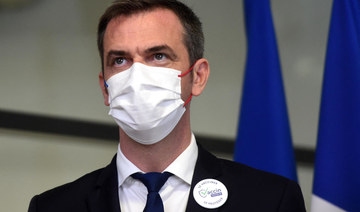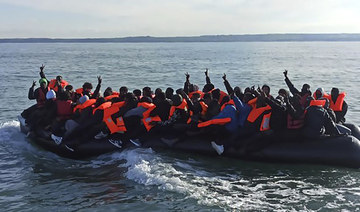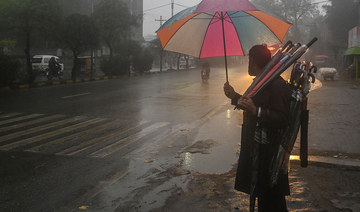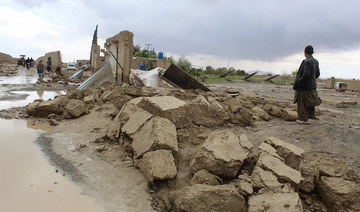LISBON/LONDON: While not a complete wash-out, the summer tourism season vital to southern Europe’s economies will be less than sizzling as the Delta coronavirus spreads and travel hurdles keep British and other sun-seekers at home.
A European Union COVID-19 travel certificate launched on Thursday may help some make trips but arrivals to tourist hotspots from Portugal to Croatia are set to remain well down on normal levels, putting businesses and hospitality jobs at risk.
“The recovery of tourism in Portugal has come to a halt,” Raul Martins, head of the country’s AHP hotel association said of new travel restrictions from Britain and Germany, normally lucrative markets for Portugal’s beaches, restaurants and clubs.
The fast-spreading Delta variant of coronavirus is pushing a rise in cases in the Algarve’s tourist magnet Albufeira and is to blame for over half of new infections in the capital Lisbon.
Add to that Britain’s decision last month to strike Portugal from its “green list” of destinations and Germany’s move to curb travel there just ahead of the introduction of EU certificates showing a tourist’s double-vaccination or COVID-free status.
Even before the German decision and a recent Portuguese rule for unvaccinated UK travelers to quarantine, hotels there forecast occupancy rates of just 43 percent this month and 46 percent for August. AHP said hotels would be more downbeat if polled now.
Save for a few bright spots, the sector is seeing the same pattern across the entire south of Europe: better than the lost summer of 2020, but barely half the activity it would normally expect before the pandemic.
In Greece, where tourism makes up a fifth of the economy, the central bank this week cited concerns over new variants as it cut forecasts for 2021 tourism revenues from 50 percent to 40 percent of those in 2019, when it welcomed a record 33 million visitors.
Grigoris Tassios, head of Greece’s Hoteliers Association, said the average occupancy rate at hotels across the country was currently 35-45 percent, a rate he saw persisting through early July.
“Bookings have frozen clearly because of the uncertainty over COVID and particularly the Delta variant lately,” he said.
Spain is a shade more optimistic, raising its estimate for this year’s tourist numbers to 45 million visitors — about 54 percent of 2019 levels — from the 42 million it predicted a month ago.
The tourism ministry on Wednesday was particularly upbeat about the German market, expecting the number of German tourists to reach 3.8 million this year, a strong 77 percent of 2019 numbers.
Mallorca and Spain’s other Balearic islands are meanwhile reaping the benefit of the June 30 move by the UK to allow Britons to travel there without having to quarantine upon return: air bookings there stand at 80 percent of pre-pandemic levels.
“Since restrictions for UK tourists were lifted, they are back. In the first 24 hours, we had reservations equivalent to 10 days of 2019,” said a spokesperson for Spanish chain Melia Hotels.
In the northern European countries which provide the sun-seekers, holiday industries are lobbying governments to find safe ways to make more destinations available — and quickly.
Britain’s plan to restart travel in May after over four months of lockdown has to date hugely disappointed tour operators, with only a limited number of smaller destinations currently on its “green list” of quarantine-free travel.
“This is not the meaningful restart of international travel that the industry desperately needs,” said a spokesperson for ABTA, the UK industry body representing 4,300 travel brands.
It is urging the government to make good on proposals to relax quarantine rules for fully vaccinated individuals visiting countries on the “amber list” like Spain and France.
“But this needs to happen soon so businesses can save what remains of the peak summer season, crucial weeks which represent two-thirds of travel companies’ income,” said the spokesperson.
A major headache for the UK industry is coping with sudden rule changes in destination countries — Malta, for instance, banned British visitors who are not fully vaccinated on Tuesday.
Germany’s travel sector is also demanding clarity after the move to declare Portugal a “virus-variant zone,” a measure that implies a 14-day quarantine for travelers. Industry leaders warned the government this week any steps to include countries like Greece and Spain in that band would be devastating.
“This current debate about further possible changes is needlessly disconcerting people and damaging confidence,” said Thomas Bareiss, the government’s federal tourism commissioner.
Some remain upbeat. Tomas Dvorak, economist at Oxford Economics, said southern Europe could still recoup by the end of the year around 85 percent of its 2019 levels if vaccine campaigns continue to step up and bring overall infections down.
But a McKinsey report this week painted a stark picture of the wider damage to the region’s economy, with a full recovery of foreign tourism in some cases not likely before 2024-2025.
It estimated Portugal would lose some 52 billion euros of revenues between 2020-2023 — the equivalent of a quarter of its total 2019 GDP — with up to 600,000 jobs potentially affected.
In Spain’s case, it said international tourism might not recover till 2025, putting a massive 4.4 million direct and indirect jobs at risk. It saw Italy benefiting from a more resilient domestic tourist market to recover earlier in 2024.
While a UN study this week welcomed the EU COVID-19 pass as a rare example of countries harmonizing arrangements on travel, it will not be enough to rescue the European summer.
Capital Economics argued it did not remove constraints for those not fully vaccinated — meaning many travelers including children will still need to undergo COVID-19 tests — and that specific travel rules were still set by national governments.
That is a point that resonates in Portugal, still stung by the German travel curbs.
“There are different countries and each country wants to show its sovereignty,” said the AHP’s Martins. We believe that the certificate will work but there are countries saying ‘my house, my rules’.”
Rising Delta virus, absent Brits dampen Europe’s tourism hopes
https://arab.news/j9mzf
Rising Delta virus, absent Brits dampen Europe’s tourism hopes
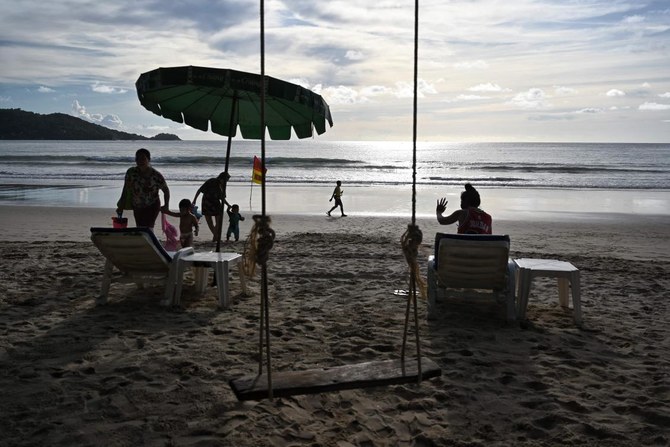
- The fast-spreading Delta variant of coronavirus is pushing a rise in cases globally
Macron blasts ‘ineffective’ UK Rwanda deportation law

PARIS: French President Emmanuel Macron on Thursday said Britain’s plan to send asylum seekers to Rwanda was “ineffective” and showed “cynicism” while praising the two countries’ cooperation on defense.
“I don’t believe in the model ... which would involve finding third countries on the African continent or elsewhere where we’d send people who arrive on our soil illegally, who don’t come from these countries,” Macron said.
“We’re creating a geopolitics of cynicism which betrays our values and will build new dependencies, and which will prove completely ineffective,” he added in a wide-ranging speech on the future of the European Union at Paris’ Sorbonne University.
British MPs on Tuesday passed a law providing for undocumented asylum seekers to be sent to Rwanda, where their asylum claims would be processed and where they would stay if the claims succeed.
The law is a flagship policy for Prime Minister Rishi Sunak’s government, which badly lags the opposition Labour Party in the polls, with an election expected within months.
Britain pays Paris to support policing of France’s northern coast, which aims to prevent migrants from setting off for perilous crossings in small boats.
Five people, including one child, were killed in an attempted crossing Tuesday, bringing the toll on the route so far this year to 15 — already higher than the 12 deaths in 2023.
But Macron had warm words for London when he praised the two NATO allies’ bilateral military cooperation, which endured through the contentious years of Britain’s departure from the EU.
“The British are deep natural allies (for France), and the treaties that bind us together ... lay a solid foundation,” he said.
“We have to follow them up and strengthen them because Brexit has not affected this relationship,” Macron added.
The president also said France should seek similar “partnerships” with fellow EU members.
US alarmed by signs of ‘imminent military offensive’ in Darfur

WASHINGTON: The US has warned of a looming rebel military offensive on the Sudanese city of El-Fasher. This humanitarian hub appears to be at the center of a newly opening front in the country’s civil war.
After a year of fighting between the armed forces of Gen. Abdel Fattah Al-Burhan and the paramilitaries of the Rapid Support Forces, under Gen. Mohammed Hamdan Dagalo, millions have been displaced in the northeastern African country.
Until recently, El-Fasher — the last Darfur state capital not under RSF control — had been relatively unaffected by the fighting, hosting a large number of refugees.
But since mid-April, bombardments and clashes have been reported in the city and surrounding villages. The US “calls on all armed forces in Sudan to immediately cease attacks in El-Fasher,” the State Department said.
“We are alarmed by indications of an imminent offensive by the Rapid Support Forces and its affiliated militias,” it said, adding that “an offensive against El-Fasher city would subject civilians to extreme danger.”
After several days of “arbitrary shelling and airstrikes” in the city and its outskirts, a pro-democracy lawyers’ committee reported last week that at least 25 civilians had been killed.
Clashes in the eastern and northern parts of the city have already resulted in 36,000 displaced people, according to the UN’s Office for the Coordination of Humanitarian Affairs.
As the war enters its second year, the UN and US have warned the breakdown of the fragile peace in El-Fasher would be catastrophic.
The city functions as the main humanitarian hub in the vast western region of Darfur, home to around a quarter of Sudan’s 48 million people and the site of harrowing violence during this and previous conflicts.
The State Department said it had seen “credible reports” that the RSF and affiliated militias had razed multiple villages west of the city, while it condemned “reported indiscriminate aerial bombardments” in the region by Sudan’s armed forces.
Death toll in migrant boat capsize off Djibouti rises to 24: UN agency
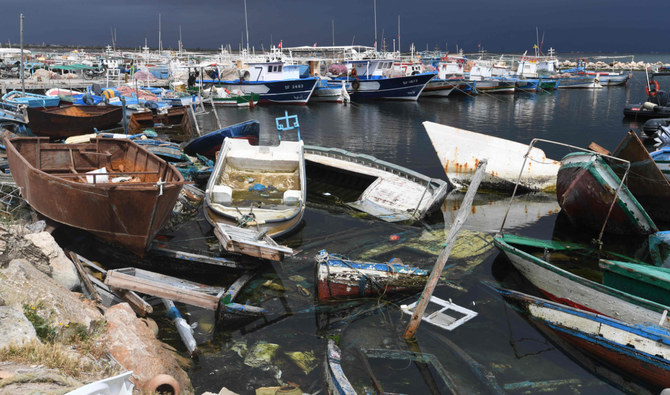
- 20 remain missing after the boat carrying at least 77 migrants, including children, capsized near the town of Obock
NAIROBI: The death toll from a migrant boat disaster off Djibouti this week has risen to 24, the UN’s migration agency said, highlighting a sharp increase in the number of people returning from Yemen to the Horn of Africa nation this year.
The capsize on Monday was the second fatal maritime accident in two weeks off Djibouti, which lies on the perilous so-called Eastern Migration Route from Africa to the Arabian Peninsula.
At least 24 people died, and 20 remain missing after the boat carrying at least 77 migrants, including children, capsized near the town of Obock, the International Organization for Migration said.
It said 33 survivors were being cared for at an IOM center in Obock and that local authorities are conducting search and rescue operations in the hope of finding more people alive.
Addis Ababa’s ambassador to Djibouti had said those on the boat were Ethiopian migrants.
Another vessel also carrying mainly Ethiopian migrants sank in the same area on April 8, with a death toll of at least 38.
“The occurrence of two such tragedies within two weeks highlights the dangers faced by children, women, and men migrating through irregular routes, underscoring the importance of establishing safe and legal pathways for migration,” IOM chief of mission in Djibouti, Tanja Pacifico, said.
The IOM said it had recorded a total of 1,350 deaths on the Eastern Route since 2014, not including this year.
In 2023 alone, it said it documented at least 698 deaths along the route, including 105 lost at sea.
The agency believed the people on both ill-fated vessels were attempting to return from Yemen to Djibouti.
Each year, tens of thousands of African migrants brave the Eastern Route across the Red Sea to reach Gulf nations, escape conflict or natural disaster, or seek better economic opportunities.
However, many are unsuccessful and “thousands are stranded in Yemen where they experience extremely harsh conditions,” the IOM said.
Since the start of 2024, the agency said 3,682 migrants have left Yemen for Djibouti, more than double the figure for the same period last year.
155 killed in Tanzania as heavy rains lash East Africa
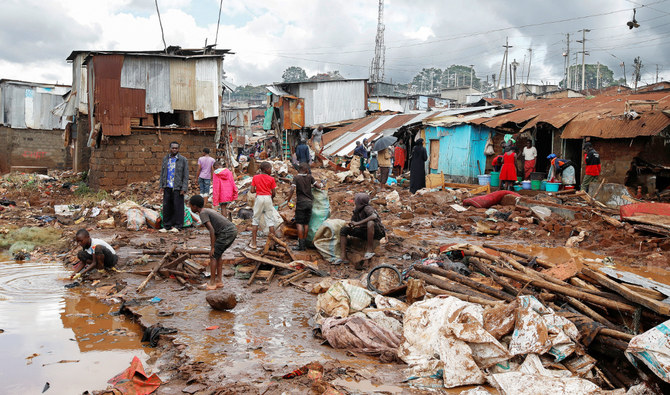
- Kenyan president convenes emergency multi-agency meeting to respond to crisis after floods cause chaos
DAR ES SALAAM, Tanzania: At least 155 people have died in Tanzania as torrential rains linked to El Nino triggered flooding and landslides, Prime Minister Kassim Majaliwa said on Thursday.
Tanzania and other countries in East Africa — a region highly vulnerable to climate change — have been pounded by heavier than usual rainfall during the current rainy season, with dozens of deaths also reported in Kenya.
Majaliwa said the rains have affected more than 51,000 households and 200,000 people, with 155 fatalities and 236 injuries.
“The heavy El Nino rains, accompanied by strong winds, floods, and landslides in various parts of the country, have caused significant damage,” Majaliwa told parliament in Tanzania’s capital, Dodoma.
He added: “These include loss of life, destruction of crops, homes, citizens’ property, and infrastructure such as roads, bridges, and railways.”
El Nino is a naturally occurring climate pattern typically associated with increased heat worldwide, drought in some parts of the world, and heavy rains elsewhere.
It can have a devastating impact on East Africa.
In Burundi, around 96,000 people have been displaced by months of relentless rains.
In addition, about 45 people have been killed in Kenya since the start of the rainy season in March, including 13 who lost their lives in flash floods in the capital, Nairobi, this week.
Kenyan President William Ruto convened an emergency multi-agency meeting on Thursday to respond to the crisis after torrential rains triggered floods that caused chaos across the city, blocking roads and bridges and engulfing homes in slum districts.
Kenyans have been warned to stay on alert, with more heavy rains forecast across the country. Officials said people living in the most vulnerable areas would be relocated.
“The government ... will do whatever it takes, apply all the required resources in terms of money and personnel to make sure that lives are not lost and the people of Kenya are protected from this disaster,” Deputy President Rigathi Gachagua told a press briefing.
Meanwhile, the UN humanitarian response agency OCHA said in an update this week that in Somalia, the Gu (April to June) rains are intensifying, with flash floods reported since April 19.
It said four people had been reportedly killed, and at least 134 families or more than 800 people were affected or displaced across the country.
Late last year, more than 300 people died in torrential rains and floods in Kenya, Somalia, and Ethiopia just as the region was trying to recover from its worst drought in four decades that left millions of people hungry.
From October 1997 to January 1998, massive floods caused more than 6,000 deaths in five countries in the region.
In March, the UN’s World Meteorological Organization said that El Nino, which peaked in December, was one of the five strongest ever recorded.
Though the weather pattern is gradually weakening, its impact will continue over the coming months by fueling the heat trapped in the atmosphere by greenhouse gases, it said.
Therefore, the WMO said in a quarterly update that “above normal temperatures are predicted over almost all land areas between March and May.”
‘Uncommitted’ organizers will join campus protesters in Michigan over Gaza

- Student protests in the US over the war in Gaza have intensified and expanded over the past week
- Democrats have become increasingly uneasy over the US support for Israel as the death toll and destruction climb in Gaza
WASHINGTON: Organizers behind the “uncommitted” political movement against President Joe Biden’s staunch support for Israel’s war against Hamas will travel to the University of Michigan’s campus on Thursday to join students protesting the war.
Student protests in the US over the war in Gaza have intensified and expanded over the past week after police first arrested students at Columbia, with so-called Gaza solidarity encampments established at colleges, including Yale, and New York University. Police have been called in to several campuses to arrest hundreds of student demonstrators.
Uncommitted organizers will travel to the University of Michigan’s Ann Arbor campus, they told Reuters, bringing together a political movement that’s disrupted Biden events and amassed hundreds of thousands of votes in Democratic primaries and a student movement that’s drawn students and faculty of various backgrounds.
Biden won Michigan by less than a 3 percent margin in 2020.
Democrats have become increasingly uneasy over the US support for Israel as the death toll and destruction climb in Gaza. A growing revolt inside the Democratic base signifies the challenge Biden faces in bringing together the coalition he needs to defeat Republican frontrunner and former President Donald Trump.
“President Biden is choosing to put his hands over his ears and ignore the hundreds of thousands of people who have already come out against the war at the ballot box,” said Abbas Alawieh, a prominent “Uncommitted” organizer, who is going to Ann Arbor with Layla Elabed, another Michigan organizer.
“Signing into law more money for Israel is sending a clear message to uncommitted voters, young voters that he doesn’t care to engage seriously with our demands to end this war,” he said, referring to the $26 billion in new aid Biden recently approved.
Alawieh said the uncommitted movement has not been coordinating with student groups so far. “We have an electoral focus, but we certainly see the demands of student protesters, who are calling for peace,” he said.
On campuses where protests have broken out, students have issued calls for a permanent ceasefire in Gaza, an end to US military assistance for Israel, university divestment from arms suppliers and other companies profiting from the war, and amnesty for students and faculty members who have been disciplined or fired for protesting.
Biden told reporters on Monday that he condemned both “antisemitic protests” and “those who don’t understand what’s going on with the Palestinians.” Biden campaign spokeswoman Lauren Hitt has said the president “shares the goal for an end to the violence and a just, lasting peace in the Middle East. He’s working tirelessly to that end.”
Trump called the campus protest situation “a mess” as he walked into his criminal trial in New York.
The uncommitted movement amassed sizable vote totals in Michigan, Minnesota and Hawaii primaries and had won 25 delegates as of the beginning of April. They are preparing to target the Democratic National Convention in Chicago in August, where Biden is expected to be nominated.
Polls show Biden and Trump running neck-and-neck ahead of their Nov. 5 election rematch nationally. Biden’s 2020 victory was due to narrow wins in key swing states like Michigan.



